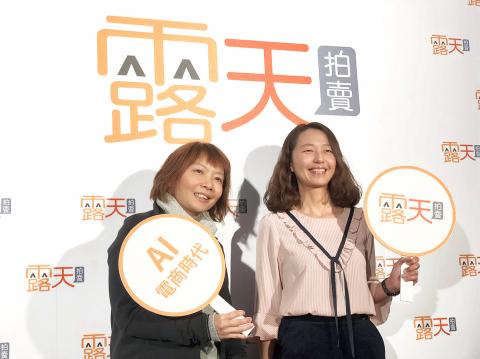Ruten.com (露天拍賣), PChome Online Inc’s (網路家庭) consumer-to-consumer (C2C) online auction operator, has not given up its plan for an overseas listing, a company executive said yesterday, adding that the company would adopt artificial intelligence (AI) solutions to boost its competitiveness.
“We are going to present a more sophisticated IPO [initial public offering] proposal compared with the previous one in 2016... PChome chairman Jan [Hung-tze, 詹宏志] will make the announcement when the timing is right,” Ruten.com general manager Vicky Tseng (曾薰儀) told a news conference in Taipei.
The company at the beginning of 2016 disclosed a plan to list on the Hong Kong stock market to expand its presence in Asia, after announcing that its gross merchandise volume (GMV) exceeded NT$14 billion (US$479.34 million at the current exchange rate) for the first time in 2015.

Photo: CNA
GMV is a gauge indicating the total sales value for merchandise sold through an online marketplace over a certain period.
However, less than a year after its announcement, PChome said it was withdrawing Ruten.com’s IPO application from the Hong Kong Exchanges and Clearing in view of fast-changing industry dynamics.
PChome did not give further details on the withdrawal, but it is widely believed that it was prompted by rival Shopee Taiwan Co Ltd’s (樂購蝦皮) aggressive approach to gain local market share, forcing PChome to change its operating strategy.
While last year was a relatively “quiet” year for Ruten.com, as its GMV grew slower-than-normal at 15 percent to NT$27.52 billion, the company spent resources to collect trading data and develop AI solutions, Tseng said.
Starting this year, Ruten.com will provide its big data analysis and AI forecast solutions to individual merchants to help them carry out precision marketing, Tseng said, adding that the company would introduce AI chatbot to increase customer service efficiency.
The company plans to expand its reach from Taiwan to Southeast and Northeast Asian markets this year by introducing international trade services for clients starting next quarter, she added.
“The scale of Ruten.com’s marketplace is considerably a large platform in East Asia... We will make use of it to expand our services in the region,” Tseng said.

To many, Tatu City on the outskirts of Nairobi looks like a success. The first city entirely built by a private company to be operational in east Africa, with about 25,000 people living and working there, it accounts for about two-thirds of all foreign investment in Kenya. Its low-tax status has attracted more than 100 businesses including Heineken, coffee brand Dormans, and the biggest call-center and cold-chain transport firms in the region. However, to some local politicians, Tatu City has looked more like a target for extortion. A parade of governors have demanded land worth millions of dollars in exchange

An Indonesian animated movie is smashing regional box office records and could be set for wider success as it prepares to open beyond the Southeast Asian archipelago’s silver screens. Jumbo — a film based on the adventures of main character, Don, a large orphaned Indonesian boy facing bullying at school — last month became the highest-grossing Southeast Asian animated film, raking in more than US$8 million. Released at the end of March to coincide with the Eid holidays after the Islamic fasting month of Ramadan, the movie has hit 8 million ticket sales, the third-highest in Indonesian cinema history, Film

Taiwan Semiconductor Manufacturing Co’s (TSMC, 台積電) revenue jumped 48 percent last month, underscoring how electronics firms scrambled to acquire essential components before global tariffs took effect. The main chipmaker for Apple Inc and Nvidia Corp reported monthly sales of NT$349.6 billion (US$11.6 billion). That compares with the average analysts’ estimate for a 38 percent rise in second-quarter revenue. US President Donald Trump’s trade war is prompting economists to retool GDP forecasts worldwide, casting doubt over the outlook for everything from iPhone demand to computing and datacenter construction. However, TSMC — a barometer for global tech spending given its central role in the

Alchip Technologies Ltd (世芯), an application-specific integrated circuit (ASIC) designer specializing in server chips, expects revenue to decline this year due to sagging demand for 5-nanometer artificial intelligence (AI) chips from a North America-based major customer, a company executive said yesterday. That would be the first contraction in revenue for Alchip as it has been enjoying strong revenue growth over the past few years, benefiting from cloud-service providers’ moves to reduce dependence on Nvidia Corp’s expensive AI chips by building their own AI accelerator by outsourcing chip design. The 5-nanometer chip was supposed to be a new growth engine as the lifecycle